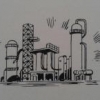Latest Downloads
-
 Water Bath Indirect Heaters
Water Bath Indirect HeatersArt Montemayor - Oct 12 2018 02:35 PM
-
 Petroleum: A Primer for Kansas
Petroleum: A Primer for KansasArt Montemayor - Oct 12 2018 02:27 PM
-
 Spray Tower for Flue Gas Scrubbing Design
Spray Tower for Flue Gas Scrubbing Designankur2061 - May 02 2018 02:31 PM
-
 Selection of Vertical Tanks
Selection of Vertical Tanksankur2061 - Apr 19 2018 07:42 AM
-
 Pressure Drop Calculator for Strainers 1
Pressure Drop Calculator for Strainers 1ankur2061 - Mar 24 2017 02:04 PM
-
 Horizontal Pig Trap System Design Guidelines
Horizontal Pig Trap System Design Guidelinesankur2061 - Jan 14 2017 02:54 PM
-
 Performance Prediction of 3-Stage Propane Refrigeration System
Performance Prediction of 3-Stage Propane Refrigeration Systemankur2061 - Aug 08 2016 02:43 PM
-
 Centrifugal Pump Troubleshooting Checklist
Centrifugal Pump Troubleshooting Checklistankur2061 - Dec 17 2015 08:18 AM
-
 Compressor Troubleshooting Checklist
Compressor Troubleshooting Checklistankur2061 - Sep 08 2015 11:43 AM
-
 Amine Sweetening Unit Preliminary Design
Amine Sweetening Unit Preliminary Designankur2061 - May 19 2015 09:35 AM
Popular Store Titles
 Tank Jacket Calculator
Tank Jacket Calculator
 Specification Sheet Collection
Specification Sheet Collection
 PIPESIZE
PIPESIZE
 Relief Valve Sizing
Relief Valve Sizing
 Rupture Disc Sizing
Rupture Disc Sizing
Chemical and Process Engineering Resources
Submitted Chris Haslego, Nov 21 2011 11:21 AM | Last updated Nov 21 2011 01:29 PM
| Category: | Refining |
| Question: | What would be the effect of cracking about 10 % atmospheric gas oils blended with vacuum gas oils in the Fluidized Catalytic Cracking Unit (FCCU)? |
| Keywords: | fccu,fcc,cracking,atmospheric,gas,oils,vacuum,fluidized,catalytic,cracking,unit |
| Answer: | If by 'atmospheric gas oil' you are referencing material boiling below 344 0C, then addition of this material to the FCC will generally cause an increase in catalyst circulation, a decrease in regenerator temperature and an increase in over all conversion. Much of this effect is due to heat balance considerations. The lighter gas oils generally do not produce sufficient coke to supply the heat necessary to vaporize them and raise them to reactor temperature. Thus, the unit heat balance forces higher conversions to produce the necessary coke from the heavier gas oils. The atmospheric gas oil does crack, but not to the extent of the heavier materials. It also tends to produce a lower octane cat naphtha. It is not uncommon to find this material in FCC feed, though it is more often the result of poor separation in the crude unit rather than a conscious operating decision. Since many of the effects are heat balance related, they are difficult to predict without a well tuned FCC model. If a model is used, it is essential that it correctly predicts the effect of conversion and cat/oil on coke yield. |
Forum Quick Links
Tech Q & A Category List
-
 Bulk Solids
Bulk Solids
-
 ChE Outside the Plant
ChE Outside the Plant
-
 Chemical Process Business
Chemical Process Business
-
 Chemistry Basics
Chemistry Basics
-
 Corrosion
Corrosion
-
 Equipment Design
Equipment Design
-
 Experimentation and Testing
Experimentation and Testing
-
 Fluid Dynamics
Fluid Dynamics
-
 Heat Transfer Technology
Heat Transfer Technology
-
 Industrial Utilities
Industrial Utilities
-
 Mass Transfer
Mass Transfer
-
 Physical Property Information
Physical Property Information
-
 Plant Basics
Plant Basics
-
 Plant Economics
Plant Economics
-
 Preparing to Become an Engineer
Preparing to Become an Engineer
-
 Process Control
Process Control
-
 Reactions and Processes
Reactions and Processes
-
 Refining
Refining
-
 Safety
Safety
-
 Separation Technology
Separation Technology
-
 The Environment
The Environment
-
 Thermodynamics
Thermodynamics

 FB
FB



0 Comments